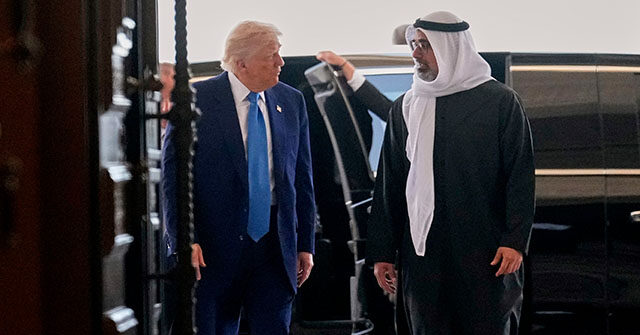“We’re making great progress for the $1.4 (trillion) that UAE has announced it intends to spend in the United States,” Trump said from Dubai, the last stop on his week-long tour of the Middle East.
“Yesterday the two countries also agreed to create a path for UAE to buy some of the world’s most advanced AI semiconductors from American companies, a very big contract. This will generate billions and billions of dollars in business and accelerate the UAE’s plans to become a really major player in artificial intelligence,” he said.
Trump did not specify what chips the UAE would be allowed to purchase, but Nvidia CEO Jensen Huang was spotted in the company of Trump and UAE President Sheikh Mohamed bin Zayed al-Nahyan on Thursday, so it seems like a safe bet that Nvidia technology will be involved. Huang on Tuesday announced a deal for Nvidia to supply 18,000 high-end processors to Saudi Arabia’s state-sponsored AI company, Humain.
According to the White House, the UAE will repay America’s trust by not only building a massive AI data center on their soil, but by helping to finance “data centers that are at least as large and powerful as those in the UAE.”
“The agreement also contains historic commitments by the UAE to further align their national security regulations with the United States, including strong protections to prevent the diversion of U.S.-origin technology,” the White House added, obliquely addressing concerns that the UAE could pass American technology along to China.
Commerce Secretary Howard Lutnick promised that “American companies will operate the data centers and offer American-managed cloud-services throughout the region,” further ensuring the security of the equipment sold to the UAE.
Reassurances are necessary because the UAE was one of the countries identified as a possible conduit for “silicon smuggling” to China in a March report by the Commerce Department. These sanctions-busting operations involve third parties buying advanced computer equipment, supposedly for legitimate end users, only to divert the shipments to China. Some of those smuggled chips were allegedly used in the development of China’s landmark DeepSeek artificial intelligence.
One reason the UAE became a top candidate for hosting a massive AI center is that artificial intelligence computing consumes massive amounts of energy.
AI centers are commonly rated not by data storage or processing capacity, but by how much energy they consume. A gigawatt data center is a big deal. The ten-square-mile campus under construction in Abu Dhabi will be rated for 5 gigawatts of power — enough to run 2.5 million top-of-the-line Nvidia chips.
The International Atomic Energy Agency (IAEA) reported in April that artificial intelligence is causing energy demand to surge around the world. Almost half of the growth in energy consumption in the United States over the next five years will be tied to data center construction.
The UAE has the energy to power explosive growth in AI – and it is planning, in turn, to use AI to revolutionize its energy market. Emirati energy companies say they have already been able to create hundreds of millions of dollars in value by using artificial intelligence to manage production lines, reservoirs, utility companies, and carbon emissions.
Saudi Arabia also made commitments to buy tens of thousands of semiconductors from Nvidia and Advanced Micro Devices (AMD) during Trump’s trip to the Middle East.
Bloomberg News reported on Thursday that some “China hawks” in the Trump administration want to pump the brakes on these chip sales until they are satisfied none of the silicon will be diverted to China, or other forbidden buyers.
White House AI adviser David Sacks, who accompanied President Trump to the Middle East, argued on Tuesday that it was best for America to make its A.I. chips the world standard while it has a clear technological advantage. Chinese mega-corporations like Huawei have been working furiously to design chips that can stack up against the best Nvidia and AMD have to offer.
“We need our friends, like the kingdom of Saudi Arabia and other strategic partners and allies, to want to build on our tech,” he said.
According to Bloomberg’s report, Sacks is open to a proposal by the UAE to build a production facility for the Taiwan Semiconductor Manufacturing Company (TSMC), which manufactures most of the chips used in Nvidia and AMD products. The “China hawks” in the administration are worried that the UAE’s economic ties to Beijing could make such a facility into a major national security risk.
Breitbart News
Read the full article .


